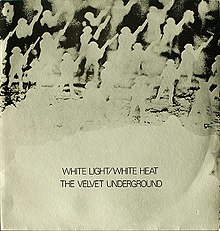| White Light/White Heat | ||||
|---|---|---|---|---|
 | ||||
| Studio album by | ||||
| Released | January 30, 1968 | |||
| Recorded | September 4–16, 1967[1] | |||
| Studio | Mayfair Sound, Manhattan | |||
| Genre | ||||
| Length | 40:13 | |||
| Label | Verve | |||
| Producer | Tom Wilson | |||
| The Velvet Underground chronology | ||||
| ||||
| 1971 UK reissue cover | ||||
 | ||||
| Singles from White Light/White Heat | ||||
| ||||
White Light/White Heat is the second studio album by the American rock band the Velvet Underground. Released on January 30, 1968, by Verve Records, it was the band's last studio album with multi-instrumentalist and founding member John Cale. Recorded after band leader Lou Reed fired Andy Warhol, who had produced their debut album The Velvet Underground & Nico, they hired Steve Sesnick as a manager and hired producer Tom Wilson, who had worked on the band's debut. White Light/White Heat was engineered by Gary Kellgren.
The album includes lyrically transgressive themes like their debut, exploring topics such as sex, amphetamines, and drag queens. Reed was inspired by a variety of authors, including William S. Burroughs and Alice Bailey, and the lyrics create a cast of characters, such as in "The Gift" and those named in "Sister Ray". Musically, he took influence from jazz music and players such as saxophonist Ornette Coleman. Warhol conceived the album's cover art, although he is officially uncredited.
White Light/White Heat was recorded quickly and modeled after the band's live sound and techniques of improvisation, since they often played loud with new equipment from an endorsement deal with Vox. However, the final product was compressed and distorted—most members were dissatisfied with the final product and it was followed with the less experimental The Velvet Underground the following year; Cale would leave the band later in 1968. The distortion level became a prototype for punk rock, shoegaze[2] and noise rock. The 17-minute "Sister Ray" is widely considered the standout track by critics and fans.
White Light/White Heat sold fewer copies than The Velvet Underground & Nico, and peaked at 199 on the Billboard Top LPs chart. The album's only single, "White Light/White Heat", failed to chart, which the band blamed on airplay bans and lack of promotion from Verve. The album was dismissed by many contemporary mainstream music critics, although underground newspapers took notice. Ultimately, White Light/White Heat had a significant impact on early forms of punk rock and no wave and has appeared on several lists of the greatest albums of all time, including being placed at number 272 on Rolling Stone's list of the "500 Greatest Albums of all Time" in 2020.
- ^ Unterberger, Richie (2009). White Light/White Heat: The Velvet Underground Day-by-Day. Jawbone Press. p. 161. ISBN 9781906002220.
- ^ Exclaim! Sound of Confusion article on Shoegaze Archived January 22, 2009, at the Wayback Machine. Retrieved 22 September 2008.